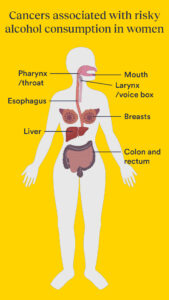A concerning number of Australian women are drinking at dangerous levels despite knowing that it is likely to be causing them harm, warn Flinders University researchers.
A new study has found that a significant number of Australian women (over 300,000) are now regularly drinking at very high-risk levels (11 or more standard drinks in one sitting at least once per month) which is also known as binge drinking.

“Despite being more vulnerable to alcohol-related harms, women have historically been underrepresented in alcohol research,” says Victoria Kostadinov from the College of Medicine and Public Health.
“In particular, research regarding women who drink at very high levels is lacking, with most of the research not differentiating between those who drink slightly above the official guidelines (4 standard drinks per day/10 per week) and those who drink well above these levels.
“What makes this especially concerning is that unfortunately women are more susceptible than men to experiencing severe health problems from excessive drinking, including liver issues, cardiovascular disease, cancers and mental health issues like depression and anxiety,” she says.
There is also growing evidence that alcohol may interact with women’s natural biological rhythms, such as estrogen and progesterone cycles, and that the impact of alcohol worsens with age and the menopause.
Daily alcohol consumption among Australian women increased by 203 per cent between 1950 and 1980, compared to just 6 per cent among men. This divergence in trends highlights the changing patterns of alcohol use and its impact on different genders.
At the same time, research has shown that since the 1990s there has been a clear push to market alcohol products, drinking spaces and drinking culture specifically targeted at women.
The study is the first of its kind in Australia to examine the prevalence and characteristics of women who drink at very high-risk levels – and compare it with men – to create a national profile.
In line with previously published data, the study found that a greater proportion of men consumed alcohol at very high-risk levels than women (10.4 per cent of men and 3.1 per cent of women), however the results indicate that many Australian women are also drinking at very high rates.
Furthermore, the characteristics of these women appear to be different from their male counterparts with women more likely to be younger, unmarried, experience high psychological distress, and have a mental health condition compared to men who drink at similar levels.
“Our findings support the need for tailored strategies to prevent and manage very high-risk consumption among women, with a focus on how sex and gender can affect responses to treatment, policies, and health promotion messages,” says Ms Kostadinov.

It’s important for people to know that alcohol is classified as a group 1 carcinogen, this is the highest risk group, which also includes asbestos, radiation and tobacco, says Professor Jacqueline Bowden, Director of the National Centre for Education and Training on Addiction (NCETA).
“Alcohol consumption can increase women’s risk of various cancers, including digestive, breast and pancreatic cancer, as well as other health issues and being susceptible to alcohol-related abuse.
“The findings from this research highlight the need for tailored strategies to prevent and manage very high-risk consumption among women.
“By monitoring and understanding these trends, we hope to help inform public health policies and ensure women can access appropriate supports to reduce alcohol-associated harms,” Professor Bowden adds.

‘Factors associated with very high-risk drinking in the Australian general population: How do men and women compare?’ by Victoria Kostadinov, Billie Bonevski, Nathan J. Harrison, and Jacquie Bowden published in the journal Drug and Alcohol Review, DOI:10.1111/dar.13865
Also see ‘Social Class and Changes in Australian Women’s Affect and Alcohol Consumption During COVID-19′ by Belinda Lunnay, Barbara Toson, Carlene Wilson, Emma Miller, Samantha Beth Meyer, Ian Olver, Kristen Foley, Jessica Thomas and Paul Ward was published in the journal Frontiers in Public Health, DOI:10.3389/fpubh.2021.645376.
Support can be found at the National Alcohol and Other Drugs Hotline








